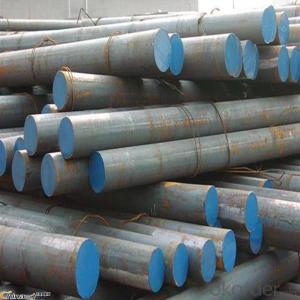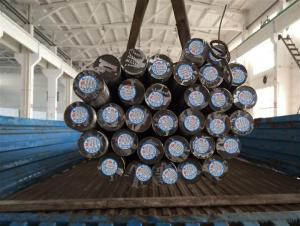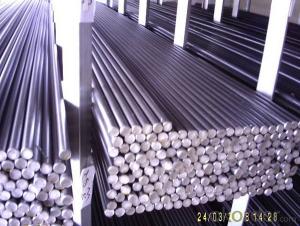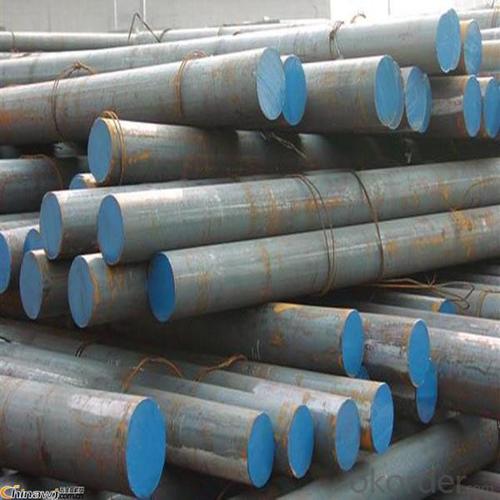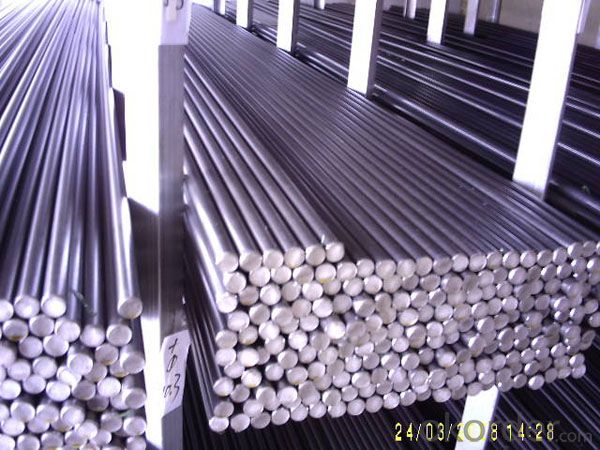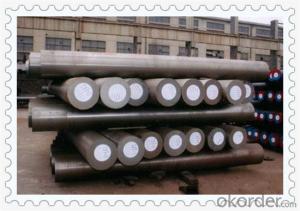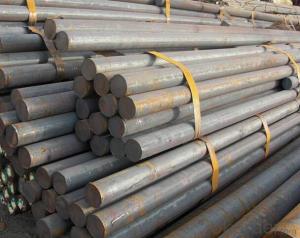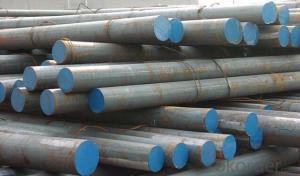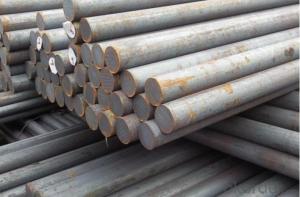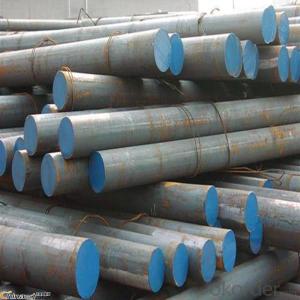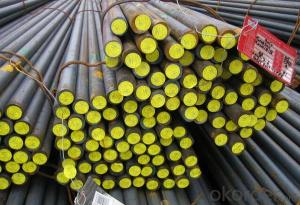AISI 4140 Steel, SAE 4140 Steel Round Bar
- Loading Port:
- China main port
- Payment Terms:
- TT OR LC
- Min Order Qty:
- 30 m.t.
- Supply Capability:
- 10000 m.t./month
OKorder Service Pledge
OKorder Financial Service
You Might Also Like
Specification
AISI 4140 Steel, SAE 4140 Steel Round Bar
Product Information:
| Size | ||||||||
| Round bar | Diameter(mm) | Length (mm) | ||||||
| 20~800 | 3000~9000 | |||||||
| Plate | Thickness(mm) | Width (mm) | Length (mm) | |||||
| Max:800 | Max:2200 | Max:9000 | ||||||
| The specification can be customized. | ||||||||
| Chemical Compositons | ||||||||
| Grade | C | Si | Mn | P | S | Cr | Mo | Ni |
| 42CrMo | 0.38~0.45 | 0.17~0.37 | 0.50~0.8 | ≤0.035 | ≤0.035 | 0.9~1.2 | 0.15-0.25 | ≤0.3 |
| 4140 | 0.40~0.45 | 0.15~0.35 | 0.75~1.0 | ≤0.035 | ≤0.040 | 0.8~1.1 | 0.15-0.25 | - |
| SCM44 | 0.38~0.43 | 0.15~0.35 | 0.60~0.9 | ≤0.030 | ≤0.030 | 0.9~1.2 | 0.15-0.30 | ≤0.25 |
| 1.7225 | 0.38~0.45 | ≤0.40 | 0.60~0.9 | ≤0.025 | ≤0.035 | 0.9~1.2 | 0.15-0.30 | |
Features of 4140 alloy steel
1, Chromium molybdenum alloy steel
2, Slightly higher carbon content then 4130
3, Greater strength and heat treatment
Typical Applications
1, Applications in the oil and gas sector
2, Connection rods, collets, conveyor pins,
3, Gears, stem assemblies,
4, Pump shafts and tool holders
Product Overviews:
| Product Name | Typical Grades | Diameter(mm) | Standard adopted |
| Carbon Steel | 20 (1020/S20C/C22) | Ø16-Ø300 | GB/SAE/JIS/DIN |
| 40 (1040/S40C/C40) | |||
| 45 (1045/S45C/C45) | |||
| Bearing Steel | GCr9 (51100/SUJ1) | Ø12-Ø250 | |
| GCr15 (52100/SUJ2/100Gr6) | |||
| GCr9SiMn (A485-Gr.1/SUJ3) | |||
| Cr-Mo Steel | 20Cr (5120/SCr420H/20Cr4) | Ø12-Ø250 | |
| 40Cr (5140/SCr440/41Cr4) | |||
| 42CrMo(4140/SCM440/42CrMo4) | |||
| Gear Steel | 20CrNiMo | Ø16-Ø600 | |
| 20CrMn(5115/SMnC420/20MnCr5) | |||
| 20CrNiMo(8620/SNCM220/20CrMiMo2) |
Product Show:

Our Advantages:
· Industry experience over 20 years.
· Shipment of goods -More than 70 countries worldwide.
· The most convenient transport and prompt delivery.
· Competitive price with best service.
· High technical production line with top quality products.
· High reputation based on best quality products.
With our experienced, enthusiastic and dynamic staffs, we assure to bring you the products with best quality, reasonable prices and good after-sales services under the motto: Friends First, Business After.
Communication, Experience, Expertise and Best efforts are our Promises to you.
- Q: What are the specific requirements for special steel used in the railway wheel industry?
- The specific requirements for special steel used in the railway wheel industry include high strength and toughness, excellent wear resistance, good heat resistance, and the ability to withstand heavy loads and impact. The steel must also have low levels of impurities to ensure its durability and longevity in the demanding railway environment. Additionally, it should possess good fatigue resistance to withstand repeated stress cycles and meet specific dimensional and mechanical property standards set by the industry.
- Q: How is special steel used in the production of engine components?
- Special steel is used in the production of engine components due to its high strength, durability, and resistance to heat and corrosion. It is commonly used for manufacturing pistons, crankshafts, valves, and connecting rods, ensuring the engine's optimal performance and longevity. Additionally, special steel's ability to withstand extreme temperatures and stress makes it an ideal choice for critical engine parts, enabling them to function efficiently under demanding conditions.
- Q: How are nickel-based alloys used in the aerospace industry?
- Nickel-based alloys are extensively used in the aerospace industry due to their exceptional strength, heat resistance, and corrosion resistance properties. These alloys are commonly used in the manufacturing of various aerospace components such as turbine blades, combustion chambers, and exhaust systems. Their high temperature stability allows them to withstand extreme conditions in jet engines, while their corrosion resistance ensures longevity and reliability. Additionally, nickel-based alloys also contribute to weight reduction in aircraft, as they possess a high strength-to-weight ratio, making them an ideal choice for enhancing fuel efficiency and overall performance in the aerospace industry.
- Q: What are the different methods of controlling the grain size in special steel?
- There are several methods to control the grain size in special steel, aiming to achieve the desired mechanical properties and performance. Some of these methods include: 1. Alloying: By carefully selecting and controlling the composition of alloying elements in the steel, the grain size can be controlled. For example, elements such as niobium, vanadium, and titanium can effectively refine the grain size. 2. Heat treatment: The heat treatment process plays a crucial role in controlling the grain size. Techniques like annealing, normalizing, and quenching can be employed to manipulate the grain size. For instance, slow cooling during annealing promotes the growth of larger grains, while rapid cooling during quenching can lead to smaller grain sizes. 3. Deformation processing: Applying mechanical deformation, such as rolling, forging, or extrusion, can help refine the grain structure. These processes induce strain and promote the formation of smaller and more uniform grains. 4. Grain growth inhibitors: Adding certain elements to the steel, such as aluminum or zirconium, can act as grain growth inhibitors. These elements form fine particles that impede grain growth during heat treatment, resulting in a smaller grain size. 5. Transformation temperature control: By controlling the transformation temperature during heat treatment, the grain size can be manipulated. For example, lowering the austenitizing temperature can produce a finer grain structure in the final product. 6. Rapid solidification: Utilizing techniques like spray forming or rapid quenching can result in an ultrafine-grained microstructure. The rapid cooling prevents grain growth, leading to a fine and homogeneous grain structure. 7. Severe plastic deformation (SPD) techniques: SPD techniques, such as equal channel angular pressing (ECAP) or high-pressure torsion (HPT), can impose significant strain on the material, leading to a refined grain structure. These techniques are typically used for producing ultrafine-grained or nanostructured steels. It is important to note that the choice of the method for controlling grain size in special steel depends on the desired properties, the alloy composition, and the intended application of the final product.
- Q: What are the properties of corrosion-resistant stainless steel?
- Corrosion-resistant stainless steel possesses a unique combination of properties that make it highly resistant to corrosion. These properties include a high level of chromium content, which forms a protective oxide layer on the surface of the steel, preventing further corrosion. Additionally, it has low carbon content, which further enhances its corrosion resistance. The presence of other alloying elements like nickel and molybdenum also contributes to its resistance against corrosion in various environments, making it suitable for a wide range of applications.
- Q: What are the safety benefits of using special steel?
- Using special steel provides several safety benefits. Firstly, special steel is known for its high strength and durability, which makes it resistant to deformation and fracture, reducing the risk of structural failures and accidents. Secondly, special steel is often designed to withstand extreme temperatures, corrosion, and wear, making it suitable for various harsh environments and reducing the chances of equipment malfunction or failure. Additionally, special steel is frequently used in safety-critical industries such as aerospace and automotive, where it undergoes rigorous testing and quality control measures to ensure its reliability and performance. Overall, the use of special steel enhances safety by providing reliable and robust materials for critical applications.
- Q: How is special steel used in the marine supply chain?
- Special steel is used in the marine supply chain for various purposes. It is commonly used in the construction of ships and offshore structures due to its high strength and corrosion resistance properties. Special steel is also used in the manufacturing of marine equipment such as propellers, shafts, and valves, ensuring reliable performance and durability in harsh marine environments. Additionally, special steel plays a crucial role in the production of marine components, ensuring the safety and efficiency of the marine supply chain.
- Q: How does special steel perform in terms of fatigue resistance?
- Special steel typically exhibits excellent fatigue resistance due to its high strength, toughness, and ability to withstand repeated loading and stress cycles without failure. Its unique composition and manufacturing processes enhance its resistance to fatigue, making it a preferred choice in applications where durability and longevity are critical, such as aerospace, automotive, and engineering industries.
- Q: What are the properties of low-alloy steel?
- Low-alloy steel is a type of steel that contains a small percentage of alloying elements, typically less than 5%. These alloying elements enhance the strength, hardness, and corrosion resistance of the steel. Additionally, low-alloy steel often exhibits improved toughness, weldability, and formability compared to carbon steel. The specific properties of low-alloy steel can vary depending on the alloying elements used, but in general, it offers a cost-effective solution for applications that require high strength and durability.
- Q: What are the main applications of special steel in the mining equipment?
- Special steel is widely used in mining equipment due to its high strength, durability, and resistance to corrosion. It is primarily used for components such as drill bits, cutting edges, crushers, conveyor systems, and buckets. The superior properties of special steel enable these mining equipment to withstand harsh operating conditions and enhance overall productivity and efficiency in the mining industry.
Send your message to us
AISI 4140 Steel, SAE 4140 Steel Round Bar
- Loading Port:
- China main port
- Payment Terms:
- TT OR LC
- Min Order Qty:
- 30 m.t.
- Supply Capability:
- 10000 m.t./month
OKorder Service Pledge
OKorder Financial Service
Similar products
Hot products
Hot Searches
Related keywords
